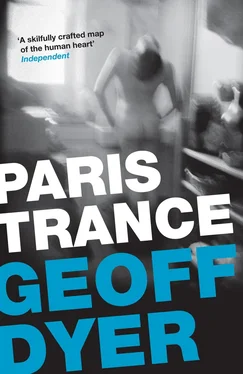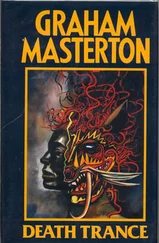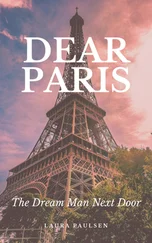‘You look lovely,’ he said.
‘Thank you.’
‘How was your dance class?’
‘It was hard,’ she said, letting go of his hand.
‘Hard?’
‘Yes, but was OK.’
‘What kind of dance do you do?’
‘Oh, is jazz or something.’
‘Jazz?’
‘Disco.’
‘Jazz disco?’
‘Tango.’
‘Tango too?’
‘Ballet.’
‘Ballet?’
‘Techno.’
‘Flamenco?’
‘A little flamenco, yes.’
Luke could not think of another form of dance. They were standing in the courtyard. Mopeds were revving into life. Nicole waved at a man — gay, surely — who blew her a kiss as he cycled off.
‘Are we standing here for a reason?’ said Luke.
‘I am standing here because you are.’ She folded her arms: ironically determined to stand her ground.
‘Shall we go?’
‘OK. Where would you like to go?’
‘We could have a drink. Have dinner. That’s what people do isn’t it? Whatever. We can go dancing if you like.’
‘Shall we walk a little first?’
‘Yes, sure. Let’s walk.’
The traffic on rue du Temple was jammed solid, the air heavy with fumes. They turned into rue des Haudriettes which was quieter: a few restaurants, clothes shops, and a cobbler’s with a pink neon sign in the shape of a shoe, tins of polish in the window. The tables at Cohn’s were all full: Americans mainly.
‘Where are you from?’ Luke said.
‘Belgrade. Have you been there?’
‘Once. I saw the Danube. Is it the Danube in Belgrade? There was a sunset. Quick, let’s cross.’
Sometimes it is difficult for people who have only just met to cross roads together: unsure if the other person prefers to dash or wait, they somehow do both, stepping into the road and then hesitating, mid-lunge.
‘Now is my turn to ask where you are from,’ said Nicole, after they had hurried across rue de Rivoli.
‘London. Have you been there?’
‘Once. I saw the Thames. Is it the Thames?’
‘In London? No.’
‘There was a sunset too. A great sunset.’
‘Maybe that was the Danube too.’
‘Or the Nile.’
‘Perhaps the Tiber.’
‘Maybe the Mississippi.’
‘The Amazon even. The conversation is flowing.’
‘Seine, actually,’ she said, pointing because they had come to the river. A bateau-mouche was going by, throwing light at the buildings behind them. They walked to the middle of the bridge, watching the oil-black water calm itself in the wake of the boat’s passing. Lights were on in apartments that commanded beautiful views of the river. In one of them they saw a man standing on his balcony looking out: contentedly watching the river, soothed by the certainty of its being there day after day; in despair, tormented by its passing (it is no good looking to views for consolation). Luke stared at the river, his gaze passing through the quiver-glint of the surface, merging with the body of water itself.
‘Stay there. Don’t move,’ she said. ‘I can see the river in your eyes. Perfect.’ She had a way of saying ‘perfect’ that seemed perfect to Luke. ‘Can you feel it?’
‘The river?’
‘Yes.’
‘Flowing through my head, yes.’ For a moment he could: a dead weight of liquid, purposeless, pressing its way to a destination that never varied; always, eventually, the sea. Reds and greens flashed and squirmed on the surface. He looked at her, feeling as if he had stood up too quickly.
‘In Oxford, in England,’ he said, ‘students jump off a bridge and break their legs because the river is full of — guess.’
‘Trolleys from supermarkets.’
‘How did you know?’
‘It is always shopping trolleys.’ A dog padded up to them and went on its way. Nicole said, ‘Once I crossed this river fourteen times in a single day.’
‘In 1922 a pilot flew his plane underneath the central arch of this bridge that we are now standing on.’
‘On the day I crossed the river fourteen times I used six different bridges.’
‘In some century, I forget which, let’s say the fifteenth, the river, swollen with melted snow from the mountains, burst its banks and flooded the entire town — even though the region was in the midst of a terrible drought.’
‘A whale once swam up it as far as the Pont d’Austerlitz, a bridge which I did not cross on the day I crossed the river fourteen times.’
‘Is that true?’
‘About the whale?’
‘Yes.’
‘No.’
At a bar on the Ile St Louis they ordered a beer and a small bottle of intense apricot juice. The beer was served in a glass so slim and elegant it was almost a vase. Nicole sat very straight in her chair, tempting Luke (who managed to sprawl on his as if it were a sofa) to compliment her on her posture. A rose-seller offered him the whole bunch for thirty francs. A slight altercation between two dogs threatened to turn nasty. At the next table a woman was listening, spellbound, as an American told her about the deal he was on the brink of clinching. Nicole sipped her apricot juice.
‘You have beautiful posture,’ said Luke. ‘And the ability to sip. I admire that. I gulp.’
‘Gulp?’
‘The opposite of sipping. I don’t even try to sip anymore. I prefer to gulp and then just sit here wishing I had sipped. Is it OK like that, by the way, or would you like some ice?’
‘It’s fine. Are you comfortable, “by the way”? You don’t look it.’
‘Oh, I am, yes.’
‘It’s bad for your back to sit like that, “by the way”.’
Luke sat up and said, ‘How did you come to be called Nicole? That’s not a Serb name is it?’
‘Was my grandmother’s name. She was French.’
‘And are you studying in Paris, by the way?’
‘I came here to study.’
‘What?’
‘Oh, I don’t know. Architecture. .’
‘Architecture?’
‘Mathematics.’
‘Ah, maths.’
‘Philosophy. Et cetera.’
‘It sounds vague.’
‘Vague? What is that? Comme une vague? A wave?’
‘Yes. Your study sounds wavy. You study waves. I mean it sounds like a lot of study.’
‘I don’t really study anything now. I came here on a scholarship. Now I just need to finish off a dissertation I have no interest in. Is nearly finished. I just need to add a comma here and there.’
‘What is it on?’
‘The same thing all dissertations are on. Nothing at all.’
‘You don’t want to be an academic?’
‘I thought I did. Once. Now, no.’
‘What do you do for money though?’
‘Translating and other things. Like everyone in Paris. And you? Why did you come here?’
‘To become a different person. Or at least more of a person.’
‘What were you before?’
‘An Englishman living in England.’
‘ Who were you before?’
‘Someone I’d lost interest in.’
‘And now you’re an Englishman living in Paris?’
‘Put like that it sounds even less interesting.’
‘How would you make it more interesting?’
‘I’m here because the bars stay open late.’
‘Are you learning French?’
‘A little.’
‘You have to. To become someone else that is essential. When I was little girl my father was very insistent that I learned other languages. He said, “The more languages you speak, the more people you can become.”’
‘I’m speechless.’
‘What is the work you do here?’
‘I work at a warehouse. Near passage Thiéré.’
‘And do you always play football?’
‘Yes, although I didn’t study it. I play every day. Rain or shine. As long as it’s not raining.’
‘My brother plays football.’
‘You have a brother? I mean how old is he, your brother?’
Читать дальше












